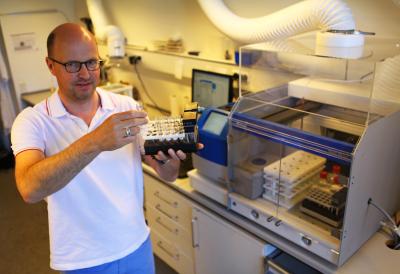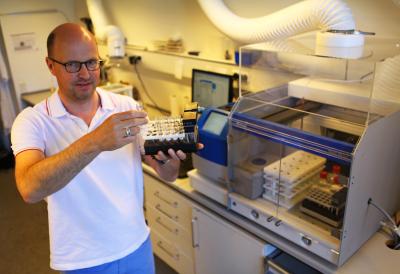
In the journal, Nature Communications, a team of Danish researchers reports that they have developed a new class of artificial proteins. In the long term, the results could lead to better treatment of cancer and diabetes.
Nature has created a host of proteins, which come in many forms, and which have many functions in our body. They are the body’s principal, and hardest working building blocks. For example, some of them provide our muscles with strength; while others make sure that our cells receive messages.
In spite of this natural diversity, in the past 20 years or so there has been great scientific interest in creating artificial proteins, in part stimulated by drug development opportunities.
Now a team of Danish researchers from University of Southern Denmark, University of Copenhagen and University of Aarhus report that they have developed a new method of creating artificial proteins.
Nature’s smallest building blocks
Artificial proteins are made from the smallest of nature’s building blocks. In this case the team of researchers have succeeded in combining so-called oligonucleotides (short DNA molecules) with peptides (small proteins). The peptides coiled around one another effectively, creating an artificial protein.
- We forced three building blocks together and managed to make them form a protein mimic, says Professor Jesper Wengel of SDU. He is the head of the BioNEC (Biomolecular Nanoscale Engineering Center) research centre.He believes that the work has significant potential:
- We have shown that it is possible to enforce peptides together by this approach. It paves the way for testing countless new combinations, which could create new artificial proteins with functions, which nature itself has not created, but which we need.
Artificial proteins have a longer lifetime
Knud J. Jensen, Professor at the University of Copenhagen’s Chemistry Department, explains:
- When you work with artificial proteins, you have better control over the proteins’ properties. This is valuable when you are developing new, protein-based drugs and enzymes. In general, proteins have a very short lifetime in a body, a key parameter which can be improved for artificial proteins.
The researchers hope that, in the future, artificial proteins can be used to treat some of the major diseases like cancer or diabetes.
First artificial proteins were developed in the nineties
In the 1970s, researchers began to chemically manufacture proteins that resembled the natural proteins. In the 1990s, work started on creating artificial proteins that have a completely different chemical design than the natural proteins.
An important part of this work is the synthetic molecule LNA (locked nucleic acid), which was developed almost twenty years ago by Jesper Wengel and Poul Nielsen at SDU.
LNA led to the establishment of the biotech company, Santaris Pharma, which was recently acquired by Roche, one of the world’s biggest pharmaceutical corporations, for DKK 2.5 billion. Today biotech companies and researchers all over the world use LNA.
###
Media Contact
Birgitte Svennevig
[email protected]
http://www.sdu.dk/
The post Researchers have developed a new class of artificial proteins appeared first on Scienmag.





